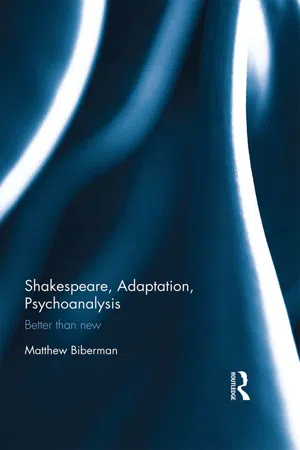
- 146 pages
- English
- ePUB (mobile friendly)
- Available on iOS & Android
About This Book
In Shakespeare, Adaptation, Psychoanalysis, Matthew Biberman analyzes early adaptations of Shakespeare's plays in order to identify and illustrate how both social mores and basic human psychology have changed in Anglo-American culture. Biberman contests the received wisdom that Shakespeare's characters reflect essentially timeless truths about human nature. To the contrary, he points out that Shakespeare's characters sometimes act and think in ways that have become either stigmatized or simply outmoded. Through his study of the adaptations, Biberman pinpoints aspects of Shakespeare's thinking about behavior and psychology that no longer ring true because circumstances have changed so dramatically between his time and the time of the adaptation. He shows how the adaptors' changes reveal key differences between Shakespeare's culture and the culture that then supplanted it. These changes, once grasped, reveal retroactively some of the ways in which Shakespeare's characters do not act and think as we might expect them to act and think. Thus Biberman counters Harold Bloom's claim that Shakespeare fundamentally invents our sense of the human; rather, he argues, our sense of the human is equally bound up in the many ways that modern culture has come to resist or outright reject the behavior we see in Shakespeare's plays. Ultimately, our current sense of 'the human' is bound up not with the adoption of Shakespeare's psychology, perhaps, but its adaption-or, in psychoanalytic terms, its repression and replacement.
Frequently asked questions
Information
Table of contents
- Cover
- Half Title
- Title Page
- Copyright Page
- Dedication
- Table of Contents
- Note on sources
- List of figures
- Acknowledgments
- Introduction: Bad writing I, or the curious case of adaptation
- 1 On primary adaptation: Shakespeare, adaptation, and psychoanalysis: The case of Nahum Tate’s Lear
- 2 Two instances of secondary adaptation: Otway, Davenant and the birth of the “crossover” episode
- Gallery of illustrations
- 3 Synchronic adaptation: Hamlet, Macbeth and The Double Falsehood
- 4 Crazy love, then and now
- 5 Exit the grave diggers / send in the clowns: Hamlet and The Enchanted Island
- Conclusion: Bad writing II, or Shakespearean adaptation and theory
- Bibliography
- Index